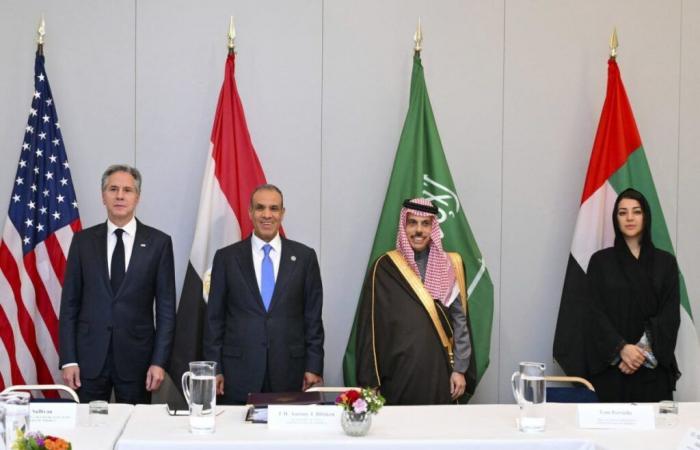The European Union's (EU) top diplomat said Tuesday there was “no excuse” for Israel to refuse a ceasefire with Hezbollah, saying all its security concerns had been taken into account in the agreement negotiated by the United States and France.
Josep Borrell, the EU's outgoing foreign policy chief, called for increased pressure on Israel to counter government hardliners who refuse to accept the deal. Speaking on the sidelines of a G7 meeting in Italy, Mr Borrell warned that if a ceasefire was not implemented “Lebanon would collapse”.
Israeli officials said Prime Minister Benjamin Netanyahu's security cabinet was scheduled to meet Tuesday to discuss a proposed ceasefire. Among the outstanding issues is Israel's request to reserve the right to act in the event Hezbollah violates its obligations under the emerging deal.
Borrell said that under the proposed agreement, the United States would chair a ceasefire implementation committee, in which France would participate, at Lebanon's request.
“Regarding the proposed agreement negotiated by the United States and France, Israel has addressed all its security concerns. There is no excuse for not implementing a ceasefire. Otherwise, Lebanon will collapse,” Borrell told reporters in Fiuggi, Italy.
After Hamas attacks in Israel in October 2023, months of back-and-forth between Israel and Iran-backed Hezbollah have escalated into full-blown war in recent months, with Israel killing top Hezbollah leaders and sending ground forces into southern Lebanon.
Israeli bombings have killed more than 3,500 people in Lebanon and injured more than 15,000, according to the Lebanese Health Ministry. On the Israeli side, around 90 soldiers and nearly 50 civilians have been killed by rockets, drones and missiles in northern Israel and in fighting on the ground in Lebanon.
The meeting of foreign ministers from the main industrialized countries of the G7, the last of the Biden administration, was dominated Monday by conflicts in the Middle East. The G7 ministers were joined by foreign ministers from the “Arab quintet”, namely Saudi Arabia, Jordan, Egypt, Qatar and the United Arab Emirates.
Mr. Borrell, whose term ends on December 1, proposed to G7 and Arab ministers that the United Nations Security Council adopt a resolution specifically demanding that humanitarian aid reach the Palestinians in the Gaza Strip, emphasizing that deliveries to this region have been completely hampered.
“The two-state solution will come later. Everything will come later. But we are talking about weeks or days for desperate Palestinians. Hunger has been used as a weapon against people who are completely abandoned,” he said.
This was a reference to the main accusation made by the International Criminal Court (ICC) in its arrest warrants against Mr Netanyahu and his former defense minister. Israel angrily rejected the accusations, calling them anti-Semitic and a victory for terrorism, and saying they failed to recognize the country's right to defend itself.
Addition to agenda
Mr. Borrell said ICC signatories, including six of the seven G7 members, are required under international law to respect and implement the court's rulings. The United States, which is not part of the ICC, called the arrest warrants “outrageous.”
Italy, host of the G7 meeting, put the ICC arrest warrants on the agenda at the last minute, but there was no consensus on the wording of the ICC's response. G7 because of the position of the United States, Israel's closest ally.
Italy also said it respected the court, but expressed concern that the arrest warrants were politically motivated and misguided, given that Mr. Netanyahu is essential to any agreement to bring a end the conflicts in the Gaza Strip and Lebanon.
“Whether we like it or not, the International Criminal Court is as powerful a court as any national court. If Europeans do not support the International Criminal Court, there will be no hope of justice,” argued Mr. Borrell.
Discussions on Ukraine
While the G7 meeting was dominated on Monday by conflicts in the Middle East, attention turned to Ukraine on Tuesday. Ukrainian Foreign Minister Andrii Sybiha was present and informed his colleagues about Russian attacks on Ukraine's energy infrastructure, Italian Foreign Minister Antonio Tajani reported.
“We want to reiterate the solidarity of Italy and the G7. Support for Kyiv is a priority,” Tajani said at the start of Tuesday’s session.
The G7 has been at the forefront of providing military and economic aid to Ukraine since the Russian invasion began in February 2022. G7 members are particularly concerned about how the Trump administration will change the approach of UNITED STATES.
Donald Trump criticized the billions of dollars that the Biden administration has poured into Ukraine and assured that he could end the war in 24 hours. These comments appear to suggest that he would pressure Ukraine to cede territory that Russia currently occupies.
Tensions have only increased since Russia attacked Ukraine last week with an experimental hypersonic ballistic missile, sparking an escalation in the nearly 33-month-old war.
Russian President Vladimir Putin argued the attack was retaliation for Ukraine's use of longer-range U.S. and British missiles capable of striking deeper into Russian territory.






